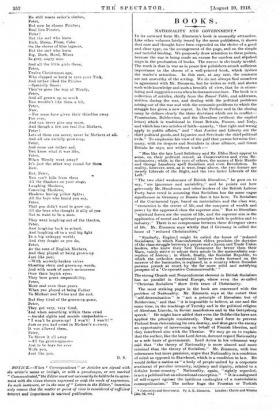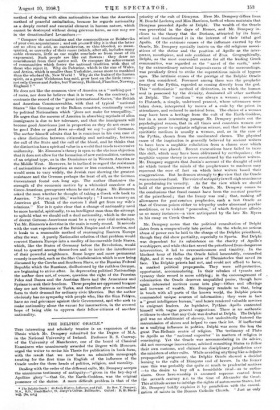BOOKS.
NATIONALITY AND GOVERNMENT.*
IN its outward form Mr. Zimmern's book is unusually attractive. Like other volumes lately issued by the same publishers, it shows that care and thought have been expended on the choice of a good and clear type, on the arrangement of the page, and on the simple and tasteful binding. We purposely draw attention to these points, because the war is being made an excuse for careless and slipshod ways in the produotion of books. The excuse is obviously invalid. The truth is that in war as in peace few publishers attach sufficient importance to the charm of a well-printed book, which invites the reader's attention. In this case, at any rate, the contents are not unworthy of the setting. We do not always find ourselves in agreement with Mr. Zinunern, but he writes so well, and shows such wide knowledge and such a breadth of view, that he is stimu- lating and suggestive even when he does not convince. The book is a collection of articles, chiefly from the Round Table, and addresses, written during the war, and dealing with the political problems arising out of the war and with the economic problems to which the struggle has given a new aspect. In the Preface and in the closing essay he defines clearly the three doctrines which are in conflict- Prussianisrn, Bolshevism, and the liberalism (without the capital letter) which is traditional in Great Britain, France, and Italy, and which has two articles of faith—namely, "that right and wrong apply to public affairs," and "that Justice and Liberty are the chief political goods, and Injustice and Servitude the chief political evils." To emphasize his view of the gulf that yawns between Ger- many, with its despots and Socialists in close alliance, and Great Britain he says, not without truth :—
" Men like the late Lord Salisbury and Mr. Elihu Root appear to some, on their political record, as Conservatives and even Re- actionaries; while, in the eyes of others, the names of Keir Hardie and George Leaisbury spell Socialism and even Revolution. In reality, however, seen, as it were, frani above, the two former are merely Liberals of the Right, and the two latter Liberals of the Left.'
" The two chief weaknesses of British liberalism," he goes on to say, "are ignorance and amiability," and he points out how grievously Mr. Henderson and other leaders of the British Labour Party have erred in assuming that Socialism has the same vague significance in Germany or Russia that it has here. To Socialism of the Continental type, based on materialism and the class war, "economics is the centre of life, and the conquest of wealth and power by the oppressed class the supreme aim." But to liberalism "spiritual forces are the centre of life, and the supreme aim is the application of moral and spiritual principles both to politics and to Industry." There is no compromise between these divergent views of life. Mr. Zlinmern says wittily that if Germany is called the home of " reduced Christianities," "Similarly, England might. be called the home of reduced Socialism,' in which Nonconformist elders proclaim the doctrine of the class-struggle between a prayer and a hymn and Trade Union leaders, who knew their New Testament far better than their Marx, vainly strive to adjust their minds to the materialistic con- ception of history ; in which, finally, the Socialist Republic, to which the orthodox continental believer looks forward on the morrow of the barricedes, is replaced, in a country where Socialist parsons preach at court, by the far more solid and satisfying prospect of a 'Co-operative Commonwealth.'" The strong Church and Nonconformist element in British Socialism has no parallel in Central Europe, where even the so-called "Christian Socialists" show little trace of Christianity.
The most striking pages in the book are concerned with the problem of -Nationality. Mr. Zinunern says at the outset that " self-determination " is "not a principle of liberalism but of Bolshevism," and that "it is impossible to believe, at one and the same time, in the teachings of Trotsky and in the political religion of Abraham Lincoln, in Soviet manifestoes and in the Gettysburg speech." He might have added that even the Bolsheviks have not applied the principle consistently. They used force to prevent Finland from determining its own destiny, and thus gave the enemy an opportunity of intervening on behalf of Finnish liberties, and they interfered also with the Ukraine. We may go on to explain that the author, like the late Lord Acton, does not regard Nationality as a safe basis of government. Lord Acton in his vehement way said that "the theory of Nationality is more absurd and more criminal than the theory of Socialism." Mr. Zimmern, with lees vehemence but more precision, urges that Nationality is a condition of mind as opposed to Statehood, which is a condition in la-N. He would define a nation as "a body of people united by a corporate sentiment of peculiar intensity, intimacy and dignity, related to a definite home-country." Nationality, again, "rightly regarded, is not a political but an educational conception." "It is a safeguard of self-respect against the insidious onslaughts of a materialistic cosmopolitanism." The author feats the Prussian or Turkish • Nationality and Government. By A. B. Mamoru. London : Chatto and Windua
(1016 wt.!
method of dealing with alien nationalities less than the American method of peaceful assimilation, because he regards nationality 88 a deeply rooted and essential element in human nature, which cannot be destroyed without doing grievous harm, as one may see in the denationalized Levantines :—
" Compare the nationalists and the cosmopolitans or Bolsheviks of your own acquaintance ; and ask yourself why it is that the latter are so often so arid, so cantankerous, so thin-blooded, so mean- spirited, so unworthy of their cause (which, after all, includes many noble elements, little as one might conclude so from most of its exponents). Such people are like cut flowers : they draw no nourishment from their native soil. Or compare the achievement of communities which foster the national tradition with that of those who reject it. Why do Palestine, which is the size of Wales, and Attica, which is smaller than Yorkshire, mean more to mankind than the wholstof ths, New World ? Why do the fruits of the human spirit, as a great Welshman has said, grow best on the little trees— not only Greece and Judea, but Tuscany, Holland, Flanders, Norway, England ? "
He does not like the common view of America as a " melting-pot " of races, nor does he believe that it is true. On the contrary, he contrasts the record of the "great international States," the British and American Commonwealths, with that of typical "national States" like Germany or the Balkan countries, continually vexed by political Nationalism which "does not make for tranquillity." He urges that the success of America in absorbing myriads of alien immigrants is due to her tolerance, and that the immigrants will become good Americans just in proportion as they do not cease to be good Poles or good Jews or—shall we say ?—good Germans. The author himself admits that he is conscious in his own case of a clear distinction between citizenship and nationality, between the call of the State and the call of the blood, and he thinks that the distinction has a spiritual value in a world that tends to excessive uniformity. Mr. Zimmem's theory is open to the obvious objection that it does not allow for the formation of new nationalities, variants of an original type, as in the Dominions or in Western America or the Middle West. Moreover, he is inclined to regard the resistance of nationalities to absorption as more or less constant, whereas it would seem to vary widely, the Jewish race showing the greatest resistance and the German perhaps the least of all, as the German Government found out. long ago. The author illustrates the strength of the economic motive by a whimsical anecdote of a Greco-American greengrocer whom he met at Argos. Mr. Zinunern asked the man whether he thought of taking a Greek wife back to America. "Not on your life," was his reply ; "I mean to marry an American girl. Think of the custom I shall get from my wife's relations." Nor is it quite clear that a change of nationality need be more harmful, spiritually, to an, intelligent man than the attempt to uphold what we should call a dual nationality, which in the case of decent Getman-Americans must he a very sore trial nowadays. Yet Mr. Zirnmern's doctrine in the main is surely sound. It accords with the vast experience of the British Empire and of America, and it leads to a reasonable method of rearranging Eastern Europe after the war. A purely Nationalist solution of that problem would convert Eastern urope into a medley of innumerable little States, which, like the States of Germany before the Revolution, would tend to quarrel among themselves and to invite the interference of their powerful neighbours. Some larger and more permanent remedy is needed, such as the Slav Confederation which is now being discussed by the Czechs and Southern Slays, or the Russian Federal Republic which the Russians, disillusioned by the ruthless German, are beginning to strive after. In deprecating political Nationalism the author does not, of course, question the right of the Prussian Poles and Danes and the Austrian Slays and the Armenians and Syrians to seek their freedom. These peoples are oppressed beceuse they are not Germans or Turk% and therefore give a nationalist form to their demand for ordinary civic -liberties. But the author obviously has no sympathy with people who, like the Sinn Folders, have no real grievance against their Government, amd who seek to make nationality alone the excuse for insurrection, in the avowed hope of being able to oppress their fellow-citizens of another nationality.



































 Previous page
Previous page